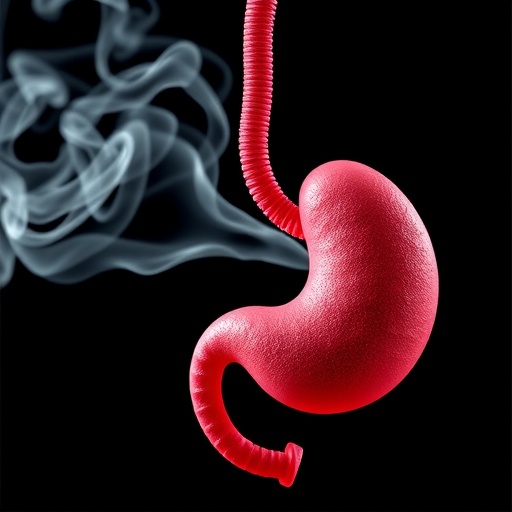How Smoking Accelerates Pancreatic Cancer: Unraveling the Immune System’s Hidden Role
Pancreatic cancer remains among the deadliest malignancies, with its insidious nature and resistance to treatment posing immense challenges to researchers and clinicians alike. Recent revelations by scientists at the University of Michigan’s Rogel Cancer Center illuminate a previously obscure pathway by which smoking exacerbates pancreatic cancer development and progression. This breakthrough not only deepens our understanding of how environmental toxins fuel this malignancy but may also pave the way for novel, targeted therapies.
Smoking is a well-established risk factor for pancreatic cancer, yet until now, the biological mechanisms linking cigarette toxins to aggressive tumor behavior have remained largely speculative. The new study, led by Dr. Timothy L. Frankel and his team, demonstrates that specific immune cells within the tumor microenvironment respond directly to chemical carcinogens present in cigarette smoke. This interaction triggers a cascade of immune signaling that dramatically accelerates tumor growth and metastatic spread.
Central to this process is a particular subset of T-regulatory cells (Tregs), immune cells traditionally known for their role in maintaining immune tolerance and preventing autoimmune disease. Intriguingly, the researchers discovered that these Tregs not only produce a potent signaling molecule known as interleukin-22 (IL-22) but also wield a double-edged sword: they simultaneously dampen beneficial anti-tumor immune responses, effectively shielding cancer cells from immune attack.
By administering a cigarette-derived chemical carcinogen to mice harboring pancreatic tumors, the investigators observed a marked elevation in IL-22 production. This cytokine promotes a pro-tumorigenic environment, fostering aggressive tumor growth and enhanced metastatic potential. Notably, mice lacking adaptive immune cells did not exhibit this tumor-promoting effect, conclusively demonstrating that the carcinogen’s influence operates through immune modulation rather than direct mutagenesis alone.
Further molecular interrogation revealed that these IL-22 producing Tregs express unique receptors capable of binding environmental toxins — receptors that are otherwise unresponsive to endogenous proteins. This binding appears to ‘activate’ the Tregs, unleashing their tumor-promoting functions. Removal of Tregs in the chemically treated mice completely reversed the tumor growth acceleration, underscoring the pivotal role of these cells in mediating the effects of smoking on pancreatic cancer.
Extending their findings beyond murine models, the researchers evaluated immune cells obtained from human pancreatic cancer patients, comparing smokers and nonsmokers. Consistent with their animal data, smokers exhibited significantly higher populations of IL-22 producing Tregs within their tumors, correlating with more aggressive disease features and poorer prognoses.
Of particular clinical interest, the study identified potential therapeutic avenues. Pharmacological inhibitors targeting the interaction between cigarette chemicals and the aryl hydrocarbon receptor (AHR) on these specialized Tregs were shown to reduce tumor size in preclinical models. This receptor-mediated pathway orchestrates the pro-tumorigenic polarization of T cells, marking it as a promising target to counteract smoking-induced tumor promotion.
The implications of such findings are profound. Pancreatic cancer notoriously exhibits an immunosuppressive microenvironment, rendering many immunotherapies largely ineffective. By disarming the super-suppressive Treg population, there is potential not only to halt tumor progression but also to enhance the efficacy of existing immunotherapeutic strategies, potentially breaking through the current therapeutic impasse.
Moreover, these findings highlight the critical need for personalized therapeutic interventions. Smokers who develop pancreatic cancer may require tailored treatment approaches that specifically address the unique immune landscape shaped by their environmental exposures. Enhanced screening protocols for high-risk individuals, particularly smokers with familial predisposition or chronic pancreatic inflammation, could facilitate earlier detection and intervention.
From a public health perspective, the study reaffirms the importance of smoking cessation and education, especially given pancreatic cancer’s notoriously silent early stages. Symptoms such as unexplained weight loss, jaundice, and back pain should trigger thorough clinical evaluation, primarily in individuals with significant smoking histories.
This research underscores the complex interplay between environmental toxins, immune modulation, and cancer progression. The discovery that cigarette smoke compounds remodel the tumor microenvironment through aryl hydrocarbon receptor-driven T cell polarization is a significant step forward. It challenges researchers to rethink how carcinogens influence not only mutational burden but also immune dynamics that shape cancer outcomes.
Future investigations will be crucial to explore the full therapeutic potential of targeting this pathway. Identifying specific inhibitors that selectively block the activation of IL-22 producing Tregs without compromising overall immune homeostasis will be paramount. Furthermore, understanding how these mechanisms integrate with other oncogenic signals could lead to combination strategies, marrying immune modulation with standard chemotherapy or novel biological agents.
In conclusion, this study elegantly delineates a mechanistic link between smoking and pancreatic cancer that involves a previously unappreciated immune axis. By revealing how environmental carcinogens subvert immune regulation to promote tumor growth, it opens exciting new doors for interventions tailored to those most at risk. As pancreatic cancer continues to claim lives worldwide, such breakthroughs kindle hope for improved outcomes through precision medicine approaches informed by immune biology.
Subject of Research: Animals
Article Title: “Aryl hydrocarbon receptor ligands drive pancreatic cancer initiation and progression through pro-tumorigenic T cell polarization”
News Publication Date: 4-Sep-2025
Web References:
https://aacrjournals.org/cancerdiscovery/article/doi/10.1158/2159-8290.CD-25-0377
References:
“Aryl hydrocarbon receptor ligands drive pancreatic cancer initiation and progression through pro-tumorigenic T cell polarization,” Cancer Discovery, DOI: 10.1158/2159-8290.CD-25-0377
Image Credits: Rogel Cancer Center
Keywords: Pancreatic cancer, Cancer research, Carcinogens, Cancer risk




